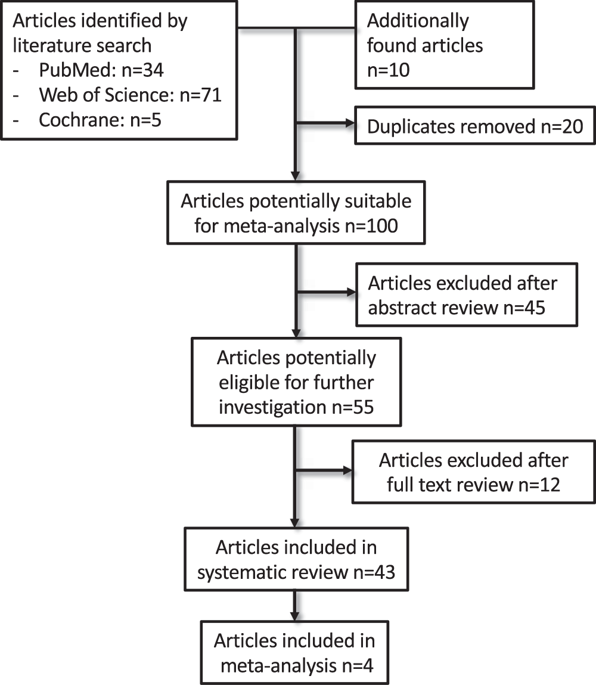Our official English website, www.x-mol.net, welcomes your
feedback! (Note: you will need to create a separate account there.)
Evaluation of the cardioprotective potential of extracellular vesicles - a systematic review and meta-analysis.
Scientific Reports ( IF 3.8 ) Pub Date : 2018-10-24 , DOI: 10.1038/s41598-018-33862-5
Sebastian Wendt 1, 2 , Andreas Goetzenich 1, 2 , Claudia Goettsch 3 , Christian Stoppe 2, 4 , Christian Bleilevens 5 , Sandra Kraemer 1, 2 , Carina Benstoem 2, 4
Scientific Reports ( IF 3.8 ) Pub Date : 2018-10-24 , DOI: 10.1038/s41598-018-33862-5
Sebastian Wendt 1, 2 , Andreas Goetzenich 1, 2 , Claudia Goettsch 3 , Christian Stoppe 2, 4 , Christian Bleilevens 5 , Sandra Kraemer 1, 2 , Carina Benstoem 2, 4
Affiliation

|
Cardiovascular diseases are the main cause of death worldwide, demanding new treatments and interventions. Recently, extracellular vesicles (EVs) came in focus as important carriers of protective molecules such as miRNAs and proteins which might contribute to e.g. improved cardiac function after myocardial infarction. EVs can be secreted from almost every cell type in the human body and can be transferred via the bloodstream in almost every compartment. To provide an all-encompassing overview of studies investigating these beneficial properties of EVs we performed a systematic review/meta-analysis of studies investigating the cardioprotective characteristics of EVs. Forty-three studies were investigated and catalogued according to the EV source. We provide an in-depth analysis of the purification method, size of the EVs, the conducted experiments to investigate the beneficial properties of EVs as well as the major effector molecule encapsulated in EVs mediating protection. This study provides evidence that EVs from different cell types and body fluids provide cardioprotection in different in vivo and in vitro studies. A meta-analysis was performed to estimate the underlying effect size. In conclusion, we demonstrated that EVs from different sources might serve as a promising tool for treating cardiovascular diseases in the future.
中文翻译:

评估细胞外囊泡的心脏保护潜力-系统评价和荟萃分析。
心血管疾病是世界范围内主要的死亡原因,需要新的治疗方法和干预措施。最近,细胞外囊泡(evs)作为保护性分子(例如miRNA和蛋白质)的重要载体而受到关注,这些分子可能有助于例如改善心肌梗塞后的心脏功能。EV可以从人体的几乎所有细胞类型中分泌出来,并且可以通过血液在几乎每个隔室中传递。为了提供全面研究电动车这些有益特性的研究概述,我们对电动车心脏保护特性的研究进行了系统的综述/元分析。根据EV来源对43项研究进行了调查和分类。我们对净化方法,电动汽车的尺寸,进行了实验,以研究电动汽车以及封装在电动汽车中的主要效应分子介导保护的有益特性。这项研究提供的证据表明,来自不同细胞类型和体液的电动汽车在不同的体内和体外研究中均具有心脏保护作用。进行荟萃分析以估计潜在效应大小。总之,我们证明了不同来源的电动汽车可能会在将来成为治疗心血管疾病的有前途的工具。进行荟萃分析以估计潜在效应大小。总之,我们证明了不同来源的电动汽车可能会在将来成为治疗心血管疾病的有前途的工具。进行荟萃分析以估计潜在效应大小。总之,我们证明了不同来源的电动汽车可能会在将来成为治疗心血管疾病的有前途的工具。
更新日期:2018-10-24
中文翻译:

评估细胞外囊泡的心脏保护潜力-系统评价和荟萃分析。
心血管疾病是世界范围内主要的死亡原因,需要新的治疗方法和干预措施。最近,细胞外囊泡(evs)作为保护性分子(例如miRNA和蛋白质)的重要载体而受到关注,这些分子可能有助于例如改善心肌梗塞后的心脏功能。EV可以从人体的几乎所有细胞类型中分泌出来,并且可以通过血液在几乎每个隔室中传递。为了提供全面研究电动车这些有益特性的研究概述,我们对电动车心脏保护特性的研究进行了系统的综述/元分析。根据EV来源对43项研究进行了调查和分类。我们对净化方法,电动汽车的尺寸,进行了实验,以研究电动汽车以及封装在电动汽车中的主要效应分子介导保护的有益特性。这项研究提供的证据表明,来自不同细胞类型和体液的电动汽车在不同的体内和体外研究中均具有心脏保护作用。进行荟萃分析以估计潜在效应大小。总之,我们证明了不同来源的电动汽车可能会在将来成为治疗心血管疾病的有前途的工具。进行荟萃分析以估计潜在效应大小。总之,我们证明了不同来源的电动汽车可能会在将来成为治疗心血管疾病的有前途的工具。进行荟萃分析以估计潜在效应大小。总之,我们证明了不同来源的电动汽车可能会在将来成为治疗心血管疾病的有前途的工具。

































 京公网安备 11010802027423号
京公网安备 11010802027423号